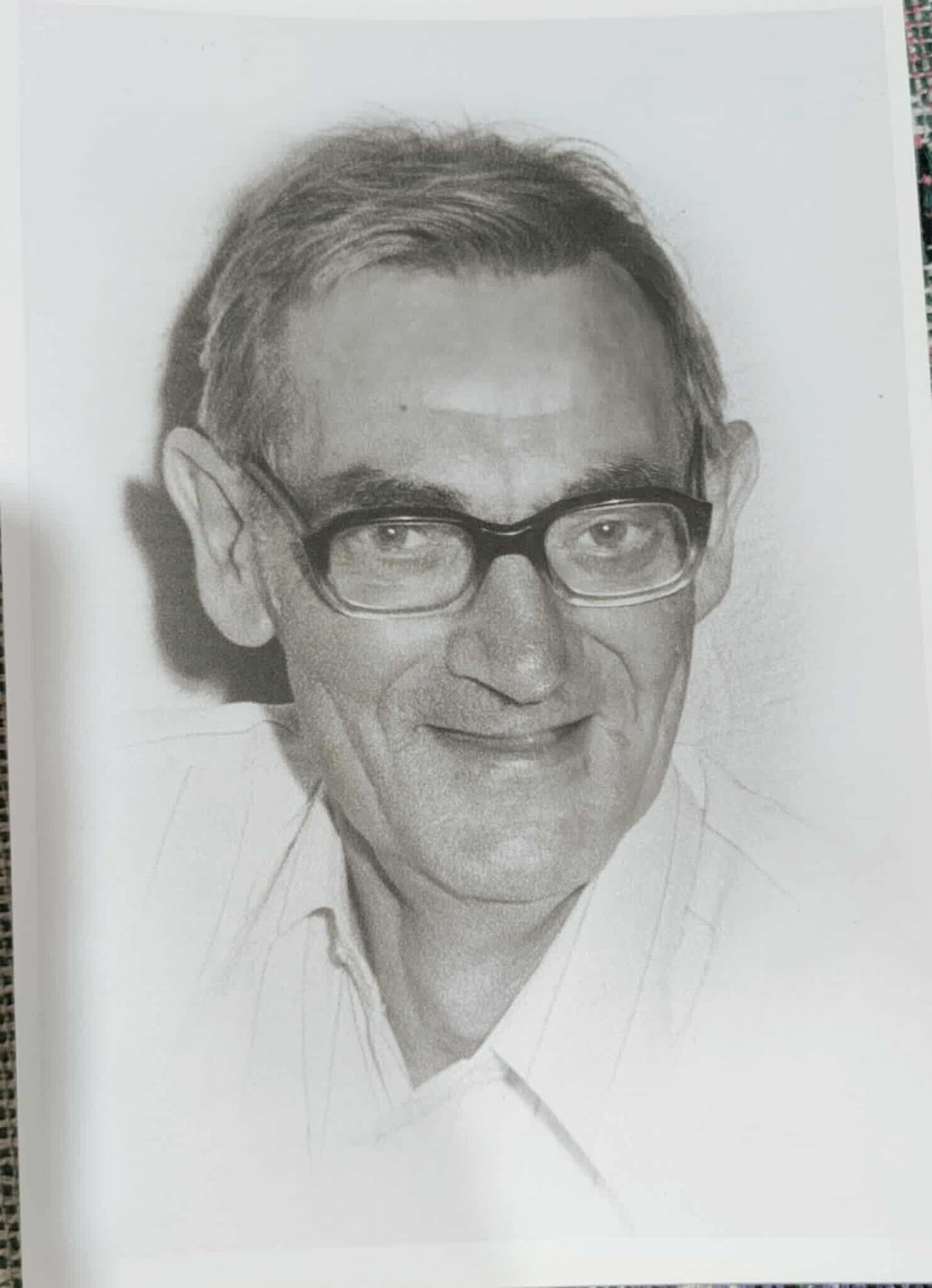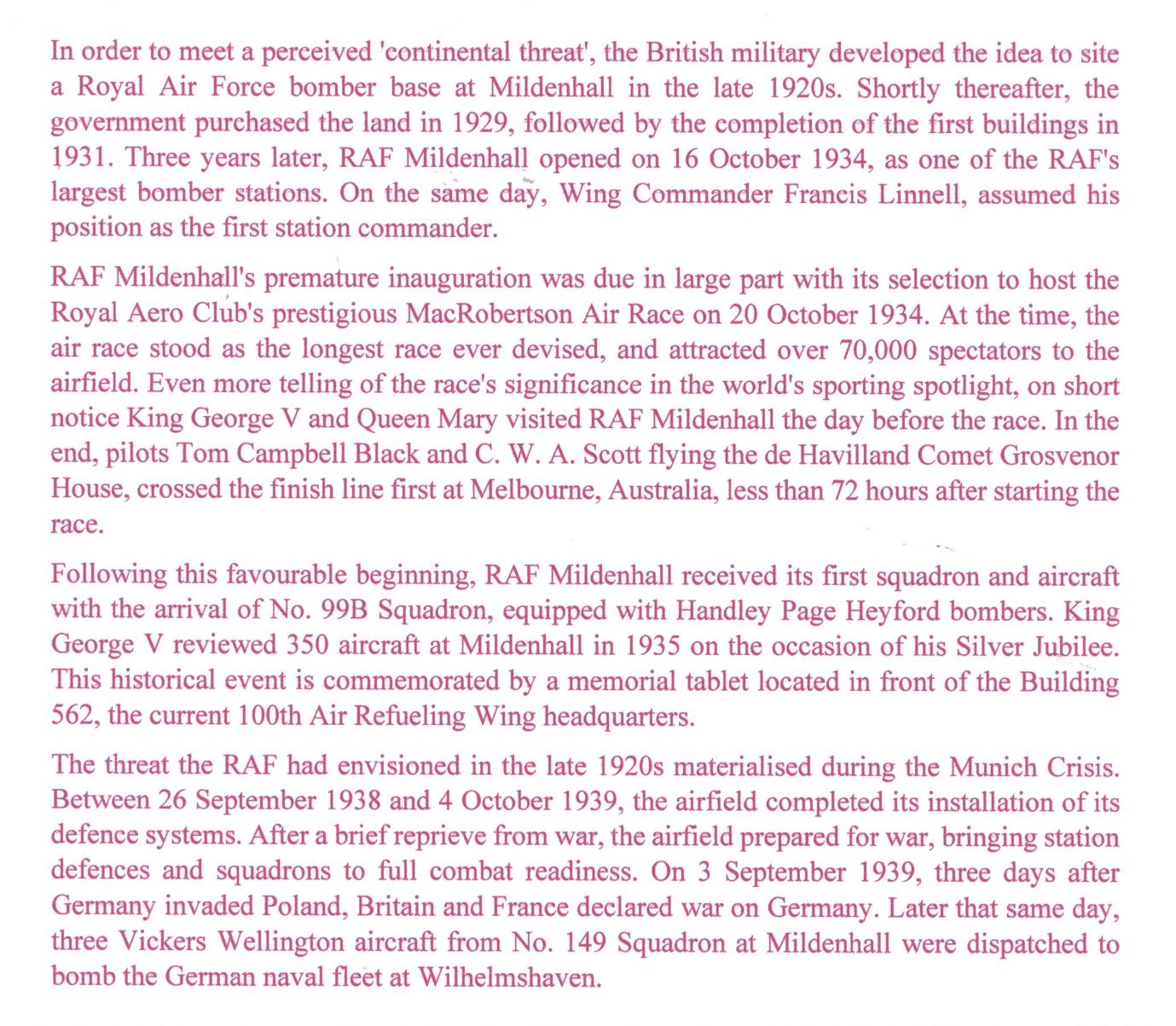My purpose is to give hope to those who have lost hope. Without hope, we remain lost in the Shadow Lands. |
****

There are few surviving photos of Cliff. This photo dates from the 1960s when Cliff was in his 40s. It is difficult now to imagine an age where our family very rarely had photos of anything. We had no cameras because cameras cost money – and cameras would have been useless anyway. Getting the film from any camera developed would have cost money our family never had.
****

This is another part of the Wiki entry about Mildenhall which I accessed on the 9th of July 2025. This extract summarises the history of RAF Mildenhall in the years leading up to WW2.
****
I have given thought to why Cliff’s Service Record makes no mention of his service in Iraq after the end of the Anglo-Iraq War. I suspect the reasons were fairly boring.
All news was heavily censored in Britain throughout WW 2. Ordinary members of the public were told only what the authorities thought they needed to know.
Apart from the obvious need to prevent genuine secrets from being leaked to Nazi Germany, the authorities were acutely aware of the need to maintain morale throughout the war.
In 1941, the threat of a German invasion of Britain still existed and the USA was a non-combatant. Most genuine war news was bad or disastrous – and until the successful conclusion of the Anglo-Iraq War, Britain’s fate was precarious. If Britain had lost in Iraq, the supply of oil would have quickly dried up and its ability to continue resisting Germany would have disappeared.
It is likely that all news about the Anglo-Iraq War was heavily censored during World War 2 and perhaps after the war’s end. If the Official Secrets Act was used to suppress news about the Anglo-Iraq War – and I think this definitely happened – Cliff’s Service record had to be censored because the Service Records of serving members of the armed forces were not generally subject to the Official Secrets Act. The Service Record had to be “edited” to match whatever official story had been placed in the public arena by the authorities.
Cliff himself was subject to criminal prosecution if he breached the Official Secrets Act.
****
This is the Wiki war summary for May 1941 excluding the Anglo-Iraq War.
1 May 1941 - Seven nights of bombing of Liverpool by the Luftwaffe begins, resulting in widespread destruction. 3 May 1941 - Belfast, Northern Ireland, experiences another heavy bombing by the Luftwaffe. British forces in Ethiopia begin the investment of Amba Alagi where Italian forces under the Duke of Aosta have taken up defensive positions. 5 May 1941 - Five years from the day he was forced to flee, Emperor Haile Selassie enters Addis Ababa, his capital, in triumph. 8 May 1941 - Heavy convoy losses in the Atlantic continue; however, one U-boat (U-110) is captured by the British navy and another copy of the "Enigma" machine is discovered and saved. It will help to turn the fortunes in the Atlantic battle. Bombing of Nottingham by the Luftwaffe. 9 May 1941 - A Japanese brokered peace treaty signed in Tokyo ends the French-Thai War. 10 May 1941 - Rudolf Hess is captured in Scotland after bailing out of his plane; his self-appointed mission was to make peace with the United Kingdom. The United Kingdom's House of Commons is damaged by the Luftwaffe in an air raid. Other targets are Hull, Liverpool, Belfast, and the shipbuilding area of the River Clyde in Scotland. This is close to the end of the Blitz, as Germany shifts its focus toward Soviet Union and the East. The "Strike of the 100,000" begins in Liège in Belgium on the anniversary of the German invasion of 1940. It soon spreads across the whole province until nearly 70,000 workers are on strike. 12 May 1941 - The RAF bombs several German cities, including Hamburg, Emden, and Berlin. 13 May 1941 - Yugoslav Army Colonel Draža Mihailović summons up the "Yugoslav Army in the Fatherland" which mostly consists of Serbs, but also includes Slovenes, Bosnians, and Croats. Mihailović treks from Bosnia into central Serbia, Ravna Gora, and issues an uprising call promising a struggle against the occupiers and the restoration of the Yugoslavian Monarchy. At this point, Josip Broz Tito and the Yugoslav Partisans are aligned with the Soviet Union which is still friendly with Germany. 16 May 1941 - Rommel defeats a counter-attack, "Brevity", at Halfaya Pass. The two sides trade alternating control of Fort Capuzzo and Halfaya Pass.
18 May 1941 - The Duke of Aosta, Viceroy of Italian East Africa, surrenders his forces at Amba Alagi. 20 May 1941 - German paratroopers land on Crete; the battle for Crete will continue for seven days. 21 May 1941 – The Italian Viceroy in Ethiopia surrenders. Remnants of Italian troops keep on fighting. 24 May 1941 - British battlecruiser HMS Hood is sunk by a powerful salvo from German battleship Bismarck in the North Atlantic. The Greek government leaves Crete for Cairo. 26 May 1941 - In the North Atlantic, Royal Navy Fairey Swordfish aircraft from the carrier HMS Ark Royal fatally cripple the Bismarck in torpedo attack. 27 May 1941 - The German battleship Bismarck is sunk in the North Atlantic by the Royal Navy, after evasive tactics, and a damaged steering system which forced it into an endless series of circular movements. 28 May 1941 - British and Commonwealth forces begin to evacuate Crete. It is clear that the defence of Crete is doomed. 31 May 1941 - Heavy Luftwaffe bombing on Dublin; numerous civilian casualties. The Mayor of Baghdad surrenders the city to British forces and ends the Anglo-Iraqi War.
|
Although the Italian army had been defeated in North Africa, the future looked extremely grim for Britain. The natural inclination of British authorities would have been to suppress news of the very close brush with disaster in Iraq.
****
Cliff’s wage when he joined the RAF in September 1940 was a miserable £36/8/- a year. By 1943, the Aircraftman rate had increased to at 3 shillings per day - £1/1/- a week or £54/12/- a year). Some idea of the financial sacrifices made by Cliff and his colleagues in the RAF can be gained from this.
Quite apart from the dangers of war, the blackout and rationing, the British were being hit hard in their pocket. The war had to be paid for and that meant almost penal levels of taxation for everyone. Income tax had already been raised to 50 per cent. In addition to rationing on food and clothing there were shortages of many commodities so there was a limited range of things people could buy even if they did have the money. The common pleasures left to the average man – smoking and drinking – were now targeted. The average wage in 1942 was £320 or just over £6 a week. |
The difference between what Cliff would have earned outside of the RAF and what he was actually paid as a serving member of the RAF was at least £5/-/- per week.
****
By helping others to heal We help ourselves heal Remember those who preceded us. Give abundant Love Always |
****
Money cannot buy the important things needed to live. It cannot buy courage or love.
Banish hatred from your heart.
Bravery multiplies with use.
We can always find courage; it is free but its value cannot be calculated. Not one of Britain’s servicemen opposed Hitler because of a desire for money.
Comments
Post a Comment